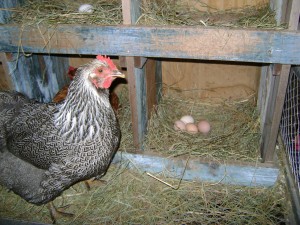Who remembers that cheery traditional song “They’re laying eggs now…? How did it go? … “Just like they used to…”? Regardless of lyrics or tune, soon it will be true around here too. The hens are well into their molting and eggs are in very short supply.
In all birds molting is the periodic replacement of feathers by shedding old feathers while producing new ones. Preening, bathing, dusting, and other feather care operations simply cannot prevent the feathers from wearing out. Feathers are dead structures at maturity, and they become gradually worn down and need to be replaced. It is a comparatively slow process, as a bird never sheds all its feathers at once; it must keep enough of its feathers to regulate its body temperature and repel moisture. Molting is generally accompanied by a sharp reduction or cessation of egg production. Natural molting is stimulated by shortening day lengths combined with stress (of any kind). Before factory farming where confinement housing in with artificial lights are the norm, the fall molt caused a fall scarcity of eggs and high market prices.
In this moment we are experiencing the pinch of eating local, not everything is available in all seasons. How can we feel good amidst the pinch? Besides celebrating the fact that Liva and Mary got all the seed garlic in and there is lots of lovely available food, including fresh young chicken and stew birds, we can be proud to not be part of a farm that practices what is called forced molting. In our complex bottom line we are committed to farm in such a way that natural processes function well. Since the early 20th century “forced molting” has been practiced where hens are purposefully stressed by withdrawing food for up to two weeks with water also occasionally withheld. Many see this temporary starving of the hens is seen as inhumane but most of the world has no clue it occurs. Other good news is that after laying continuously for nearly a year, not only does the rate of egg production decline, as do but also the quality of the eggshell and the egg contents. After molt many say the eggs are better than ever, though often less prolific.
Molting is a difficult time for birds, since it involves hormonal fluctuations and increased energy requirements. Go say hello to them in their new winter digs in the hoop house and pass along encouragement.